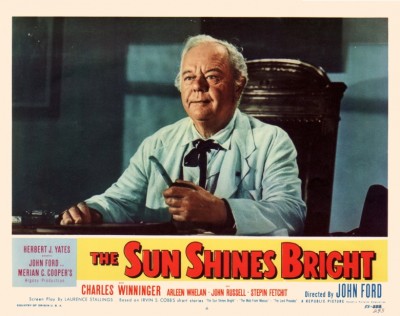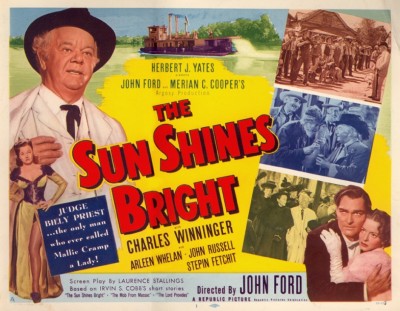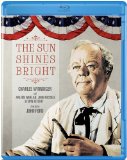| Reviews & Columns |
|
Reviews DVD TV on DVD Blu-ray 4K UHD International DVDs In Theaters Reviews by Studio Video Games Features Collector Series DVDs Easter Egg Database Interviews DVD Talk Radio Feature Articles Columns Anime Talk DVD Savant Horror DVDs The M.O.D. Squad Art House HD Talk Silent DVD
|
DVD Talk Forum |
|
|
| Resources |
|
DVD Price Search Customer Service #'s RCE Info Links |
|
Columns
|
|
|
Sun Shines Bright, The
THE MOVIE:

John Ford's 1953 character piece The Sun Shines Bright has the genial air of a backyard barbeque. Virtually plotless, but overloaded with character, the film is an odd entry in the director's canon, more laid back than its most comparable companions, like The Quiet Man or How Green Was My Valley. Ford apparently credited it as his favorite feature, yet it's a film that, frankly, I had never even heard of before this latest home video release. It seems to be a largely forgotten mid-period effort from the master cineaste. Or quite possibly swept under the carpet.
Charles Winninger stars in The Sun Shines Bright as Judge William Pittman Priest, who sits on the bench in a small Kentucky town in 1905 (taking over a role originally played by Will Rogers twenty years prior). Priest is a veteran of the Confederate army. He was the bugle player for his regiment, and he still leads the meetings when his old troupe gets back together. It's significant that these gatherings take place right next to a similar get-together of the town's Union vets--but more on that later.
The Sun Shines Bright is based on a trio of short stories by Irving S. Cobb. Thus, various scenarios drive the film, with Judge Priest at the center of them all. As an election for his seat looms, Priest must balance his sense of what is right versus his concern for his job. His opponent (Milburne Stone) is a Northerner and a reformer running on an anti-vice ticket. Priest, like all gentlemen, enjoys the occasional drink (to get the heart started) and also maybe consorts with ladies of less than savory reputations. This will be important, as the town's ingénue, Lucy Lee (Arleen Whelan), is the daughter of one such lady, though unbeknownst to her. She has been adopted by the local doctor (Russell Simpson), one of Priest's comrades. All these years, they have hidden her true lineage from her, including the fact that both men's commanding officer is Lucy's real grandfather. All of these secrets are threatened to be exposed when the town gadabout, Ashby Corwin (Rio Bravo's John Russell), comes back from his travels with intentions to court Lucy. Further complications arise when Lucy's long-lost mother (Dorothy Jordan) also returns to Kentucky to die.
Judge Priest is a classic sort of character. He is kindly and a bit humorous and perhaps even bumbling--all elements that cause many to underestimate him and his command of the law. For all his smooth talk, Priest is a strong personality who believes in right and wrong, even when it doesn't fit into convenient strictures. Charles Winninger (Show Boat) delivers an effortless performance, inhabiting the part so that there seems no distinction between the actor and his role. He is a Southern gentleman, neither conservative nor progressive. He maybe represents old ways--and as his rival accuses, ways that represent a losing philosophy--but there is something undeniably likable about him. He accepts all people, as long as they also accept him.

That said, a big reason why The Sun Shines Bright may not be as heralded as Ford's westerns or his Irish pictures is the questionable characterization of the film's African American characters. Though most of the black citizens are depicted as good, decent people, they are emblematic of a conciliatory stereotype that ultimately represents the notion that if they want to get along, then they'd better behave themselves. This backward notion is represented quite clearly in an early scene where Priest has to instruct a young boy to stop wasting his days playing the banjo and get a decent job (albeit one where he won't damage his talented fingers). More distressing than even that, however, is Priest's ever-present manservant, Jeff, who is played by the notorious character actor Stepin Fetchit. Jeff is slow-witted, poorly spoken, and cowardly--all traits that Fetchit cultivated as his regular onscreen persona. Though the act made him a major star and also a millionaire, it's still debatable whether it was worth everything else it cost in terms of public perception for other African Americans.
For as bad as that sounds, if one can set aside these troublesome elements, the actual message of The Sun Shines Bright is far more inclusive than it seems on the surface. As I mentioned, there is an important scene where Judge Priest joins his former opposition and speaks to the Union soldiers at the veterans' hall. The Judge makes a strong case for unity. As far as he is concerned, the United States of America is a special place where two different sides can disagree with one another so strongly that they can go to war, but then once the argument is settled, join together again under the same flag. This idea is backed up later when the head of the Union association joins Priest in support of Lucy's mother. Likewise, the Judge supports his talk of fairness with action, preventing a lynching when he knows the young man accused of the crime is not guilty. (And the true perpetrator turns out to be a white man who is part of the lynch mob, no less.) For whatever stereotypical images we see on screen in The Sun Shines Bright, no unkind word is spoken by any character whom we are supposed to find identifiable or likable. Rather, the emphasis is on community. Neighbors take care of one another. Be good to your fellow man, and he'll be good to you.
Or at least that's my interpretation of it. This is a discussion that could probably take on many forms. For instance, does the nostalgic air that Ford gives the picture actually make the racism seem nicer? Because, arguably, it's that same nostalgia, and that amiable Southern tone, that makes the film so inviting. (Surprisingly, Ford-hater David Thomson doesn't even mention The Sun Shines Bright in his Biographical Dictionary of Film.) Framed in the right context, I think The Sun Shines Bright is actually an important film because of the complicated reactions it inspires. The fact that it also features such amazing storytelling is a bonus. It's a hard film not to enjoy, the yarns it spins are just too good.
Which is why John Ford is still heralded as perhaps the most accomplished master of his craft. The more of his films you watch, the more his ability for weaving a disparate tapestry becomes apparent. Music and humor sit alongside drama and intrigue and even action without ever feeling incongruous. Genre is practically a meaningless distinction, unless Ford is his own genre. His camera is never insistent, and he lets his actors breathe. One gets an image of the bullish director sitting back and enjoying a cool drink on the set of this one and just letting The Sun Shines Bright happen. After all, it's his backyard and he's the host of this here barbeque, so why the hell not?
THE BLU-RAY
Video:
Olive has done a wonderful job bringing The Sun Shines Bright to Blu-Ray. The black-and-white image is framed at a 1.37:1 aspect ratio, mastered in 1080p high-definition. The overall picture quality is wonderful, with sharp resolution and a fine grain that maintains the cinematic look of Archie Stout's photography. Light and dark are balanced appropriately, and there is very little by way of print damage, just the occasional minor scratch.
Sound:
The original English-language soundtrack is mixed in mono. The audio is clean and free of pops, cracks, or hiss. Dialogue is clear and easy to hear, and Victor Young's music sounds excellent, without any brassy tones or distortion.
Extras:
None. Which is too bad, this is a movie that could benefit with some supplements, particularly something with modern supporters and detractors being given a platform to discuss the movie's depiction of race and history.
FINAL THOUGHTS:
Highly Recommended. John Ford's The Sun Shines Bright is a throwback to a bygone era, both good and bad, and without it always being clear as to which is which. Stringing together several stories featuring Irving S. Cobb's popular Judge Priest character, the film shows one Kentucky town dealing with some post-Civil War growing pains and the start of a new century. Charles Winninger is a delight as the Judge, a man who likes his drink and a good tune, and who also has an unwavering moral compass. Some may find the racial stereotypes difficult to handle at first, but my personal feeling is once you acclimate yourself to what you are seeing, there is actually a fairly strong message about unity that overpowers the more misguided choices the filmmakers made. The Sun Shines Bright is an intensely likable film, even if it's hard to like everything about the kind of life it depicts.
Jamie S. Rich is a novelist and comic book writer. He is best known for his collaborations with Joelle Jones, including the hardboiled crime comic book You Have Killed Me, the challenging romance 12 Reasons Why I Love Her, and the 2007 prose novel Have You Seen the Horizon Lately?, for which Jones did the cover. All three were published by Oni Press. His most recent projects include the futuristic romance A Boy and a Girl with Natalie Nourigat; Archer Coe and the Thousand Natural Shocks, a loopy crime tale drawn by Dan Christensen; and the horror miniseries Madame Frankenstein, a collaboration with Megan Levens. Follow Rich's blog at Confessions123.com.
|
| Popular Reviews |
| Sponsored Links |
|
|
| Sponsored Links |
|
|
| Release List | Reviews | Shop | Newsletter | Forum | DVD Giveaways | Blu-Ray | Advertise |
|
Copyright 2024 DVDTalk.com All Rights Reserved. Legal Info, Privacy Policy, Terms of Use,
Manage Preferences,
Your Privacy Choices | |||||||













